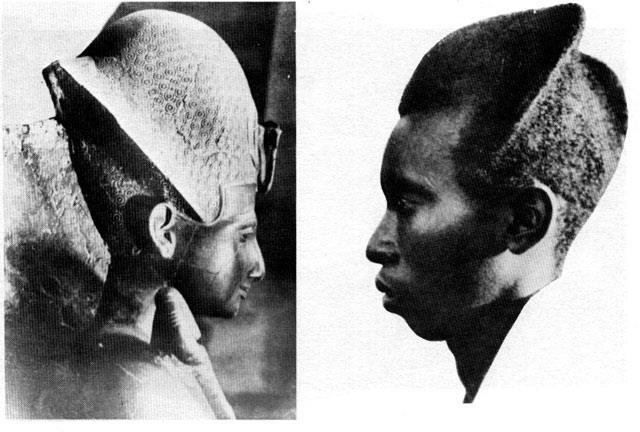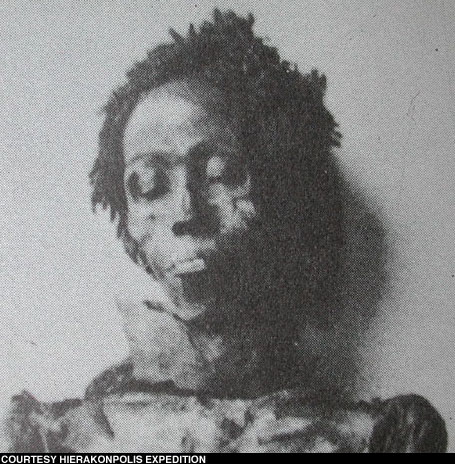Black Egyptians - Nairaland / General - Nairaland
Nairaland Forum / Nairaland / General / Black Egyptians (1526 Views)
How Do Today Egyptians Feels Reading The Bible That Speaks Against Them (2) (3) (4)
| Black Egyptians by Darteyyyy(m): 5:54am On Jul 28, 2016 |
The argument over the Egyptians’ race began in the nineteenth century when African Americans and white reformers sought to refute claims by racist pseudoscientists that people of African descent were inherently inferior to people of European descent. Unaware of the achievements of West African civilization, those who believed in human equality used evidence that the Egyptians were black to counter assertions that African Americans were incapable of civilization. During the last two decades of the twentieth century, a more scholarly debate occurred between Afrocentricists and traditionalists. Afrocentricists regarded ancient Egypt as an essentially black civilization closely linked to other indigenous African civilizations to its south. They maintained not only that the Egyptians influenced later African civilizations but also that they had a decisive impact on the Mediterranean Sea region, including ancient Greece and Rome. Therefore, in regard to philosophy and science, black Egyptians originated from Western civilization. In response, traditionalists claimed that modern racial categories have no relevance to the world of the ancient Egyptians. The ancient Greeks, they argued, developed the empirical method of inquiry and notions of individual freedom that characterize Western civilization. Not under debate, however, was Egypt’s contribution to the spread of civilization throughout the Mediterranean region. No one doubts that in religion, commerce, and art, Egypt strongly influenced Greece and subsequent Western civilizations. Egyptian religion, art, hieroglyphics, and political structure influenced Nubia. Then, with Egypt’s decline during the first millennium BCE, the Nubians established an independent kingdom known as Kush. During the eighth century BCE, the Kushites took control of upper (meaning southern because the Nile flows from south to north) Egypt, and in about 750 BCE, the Kushite king Piankhy added lower Egypt to his realm. Piankhy became pharaoh and founded Egypt’s twenty-fifth dynasty, which ruled until the Assyrians, who invaded Egypt from southwest Asia in 663 BCE, drove the Kushites out. Kush itself remained independent for another thousand years until 540 BCE when a resurgent Egyptian army destroyed Kerma, and the Kushites moved their capital southward to Meroë. The new capital became wealthy from trade with East Africa, with regions to the west across Sudan, and with the Mediterranean world by way of the Nile River. The development of a smelting technology capable of exploiting local deposits of iron transformed the city into Africa’s first industrial center. The Nubian odyssey or fascination with Nubia and its place in history is as old as the world itself. The curiosity of mankind, especially the Greeks and Romans was sparked by the writings of Herodotus, Hecataeus, and Homer when they described the exotic lands Egypt and Nubia. Did not Homer refer to Nubia as the remotest of nations, the most favorite of the Gods and Herodotus call Egypt the Gift of the Nile?. Egypt because of her proximity and her symbiotic relationship with the Nubians knew of gold, glories, and government. It took, however, the spread of myths, legends, and travels of the men and women of the Mediterranean and the east to cast the spell that led to the search for the source of life and the fountain- head of the gods and civilization itself. It is the eternal quest as the men and women of the new world are still involved with the mysteries of Nubia and Egypt the lands of the Pharaohs and Kush. Knowledge of Nubia and Egypt was destined to remain in the hands of the Islamic scholars, travelers, and the Christian monks of Egypt. When the Americas were discovered in the late fifteenth century and the courts of Europe were vying for power in the new world, Nubia and Egypt were still a mysterious pagan world. Their realities were still locked in the ancient lore and tradition of Herodotus and Diodorus Siculus. It was not until the nineteenth century that Islamic scholars were discovered and their geographies and histories of Nubia were translated for European consumption. The earliest journey of the whole length of Nubia was undertaken by Evliya Celebi, an Ottoman official in 1672-73, prior to this the interest in Egypt on the part of wealthy visitors was fixated on mummies and their medicinal and metaphysical qualities.38 Gordon Waterfield reports that “as early as 1586, John Sanderson, a member of the Levant Company, visited Egypt and shipped to England five hundred weight of mummy fragments of the to the London Apothecaries.”39 The Arabs sold “mummy powder” mixed with butter as a medicine, supposedly, to cure internal and external ulcers. Sanderson is credited with the discovery of a mummy pit at Memphis. Mummy pit consist of tombs cut back into the rock cliff-filled with embalmed bodies. The Nile, the oldest river known to the civilized world and known as Hapi, father of the Gods by the ancients, was the barometer by which the Nubians and Egyptians experienced life, They learned from experience, the mood shifts which could bring terror or joy, famine or abundance, hope, and despair. Therefore, the reverence paid the Nile was very great because one’s wealth, happiness, and prosperity depended on upon the waters of the Nile. Hapi, the god of the Nile, was placed above all gods and addressed as the “Father of the Gods”. There is a hymn that indicates if he were to fail “the gods would fall down headlong, and men would perish”. They were considered so powerful, according to the hymn, that “he cannot be sculpted in stone; he is not to be seen in the statues in which are seen the crowns of the South and the North; neither service or oblations can be offered unto him in person; and he cannot be brought forth from his secret habitations; the place where he dwelleth is unknown, he is not to be found in the shrines wherein arc inscriptions; no habitation is kludged enough to hold him; and cannot be imagined by thee in thy heart.” For more on World History, http://blarqet.com/blog-list-2/ 1 Like
|
| Re: Black Egyptians by Horus(m): 12:08pm On Apr 10, 2017 |
   Exactly the Same hairstyle |
| Re: Black Egyptians by Horus(m): 12:46pm On Apr 10, 2017 |
[img]http://mathildasanthropologyblog.files./2008/07/nubian-mummy.jpg[/img] Maiherpri Mummy (18th Dynasty, 1427-1392 BC)  Maiherpri Mummy (18th Dynasty, 1427-1392 BC) Maiherpri, Buried at Thebes in Egypt, Valley of the Kings, New Kingdom 18th Dynasty, 1427-1392 BC  Maiherpri Mummy (18th Dynasty, 1427-1392 BC) Maiherpri was buried in a Royal Egyptian Tomb in the Valley of the Kings, the royal necropolis (Egypt). The mummy was unwrapped in March 1901, revealing a very dark skin with woolly hair. In Maiherperi's tomb, a papyrus was found depicting him with literally "blackish" skin. The papyrus in question was the Book of the Dead (Picture below). Papyrus of Maiherpri |
| Re: Black Egyptians by Horus(m): 6:53pm On Apr 11, 2017 |
| Re: Black Egyptians by chariisGRACE(m): 8:24pm On Jun 09, 2020 |
Seun, Lalasticlala FP please |
(1) (Reply)
Fire Incident At Uduma St New Haven Enugu / AGF, Abubakar Malami Declares Amotekun Illegal - Yorubas, Middlebelt, Others Fir / How To Get FREE 500GB Of Data, 500,000 Airtime On Airtel Network
(Go Up)
| Sections: politics (1) business autos (1) jobs (1) career education (1) romance computers phones travel sports fashion health religion celebs tv-movies music-radio literature webmasters programming techmarket Links: (1) (2) (3) (4) (5) (6) (7) (8) (9) (10) Nairaland - Copyright © 2005 - 2024 Oluwaseun Osewa. All rights reserved. See How To Advertise. 23 |